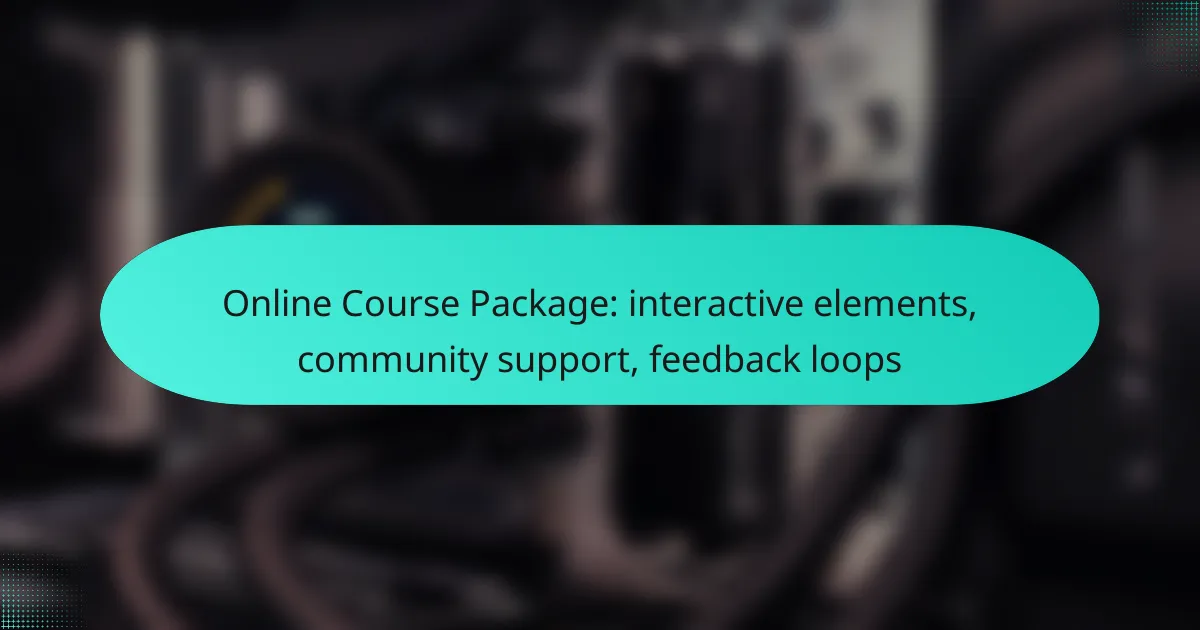Our online course package offers a rich blend of interactive elements, community support, and effective feedback loops to create an engaging learning experience. By incorporating hands-on activities and collaborative opportunities, learners can actively participate and connect with peers. Continuous feedback ensures that participants receive valuable insights to refine their skills and enhance their understanding throughout the course.

How do interactive elements enhance online courses?
Interactive elements significantly enhance online courses by engaging learners and promoting active participation. These features create a dynamic learning environment that fosters retention and understanding through hands-on experiences.
Gamification techniques
Gamification techniques incorporate game-like elements into online courses to motivate learners. This can include point systems, badges, and leaderboards that encourage competition and achievement. For example, awarding points for completing modules can drive engagement and completion rates.
When implementing gamification, consider the balance between challenge and skill level to keep learners motivated without causing frustration. Regularly updating challenges can maintain interest and encourage ongoing participation.
Interactive quizzes
Interactive quizzes serve as immediate feedback tools that assess learner understanding in real-time. These quizzes can be multiple-choice, true/false, or fill-in-the-blank formats, allowing for varied assessment styles. Incorporating quizzes after key lessons helps reinforce material and identify areas needing review.
To maximize effectiveness, ensure quizzes are concise and relevant to the course content. Providing instant feedback on answers can enhance learning by clarifying misconceptions right away.
Live polls
Live polls enable real-time interaction between instructors and students, allowing for instant feedback on topics or opinions. This can be particularly useful during live sessions to gauge understanding or gather input on discussion points. For instance, asking students to vote on a topic can spark engagement and discussion.
To effectively use live polls, keep questions straightforward and relevant to the course material. Encourage participation by making polls anonymous, which can lead to more honest responses.
Simulations and scenarios
Simulations and scenarios provide learners with practical, hands-on experiences that mimic real-world situations. This approach allows students to apply theoretical knowledge in a controlled environment, enhancing skill development. For example, a business course might use a simulation to teach financial decision-making.
When designing simulations, ensure they are realistic and relevant to the course objectives. Providing clear instructions and objectives can help learners navigate these scenarios effectively, maximizing their learning experience.

What community support options are available for online courses?
Online courses often provide various community support options to enhance learning experiences. These include discussion forums, social media groups, and peer mentoring programs, each fostering interaction and collaboration among learners.
Discussion forums
Discussion forums serve as a central hub for students to ask questions, share insights, and engage in conversations about course material. Typically organized by topics or modules, these forums allow for asynchronous communication, enabling participants to contribute at their convenience.
When using discussion forums, it’s essential to actively participate and respond to others to build a sense of community. Consider setting aside regular times each week to check in and contribute, which can enhance your learning and help others as well.
Social media groups
Social media groups, often found on platforms like Facebook or LinkedIn, provide a more informal space for students to connect. These groups can facilitate real-time discussions, sharing of resources, and networking opportunities, making them a valuable complement to structured course content.
To make the most of social media groups, engage with posts, share relevant articles, and ask questions. However, be mindful of the potential for distractions and ensure that your participation remains focused on course-related topics.
Peer mentoring programs
Peer mentoring programs pair students with more experienced peers who can offer guidance and support throughout the course. These relationships can provide personalized feedback, accountability, and motivation, enhancing the overall learning experience.
When participating in a peer mentoring program, set clear goals for what you hope to achieve and maintain open communication with your mentor. This proactive approach can lead to more meaningful interactions and greater success in your studies.

How do feedback loops improve learning outcomes?
Feedback loops enhance learning outcomes by providing continuous input on performance, allowing learners to adjust their strategies and improve their understanding. These loops create a dynamic environment where learners can refine their skills based on regular evaluations and responses from instructors or automated systems.
Regular assessments
Regular assessments are crucial for establishing feedback loops, as they offer learners timely insights into their progress. These can include quizzes, assignments, or practical exercises that gauge understanding and retention of material. Frequent assessments help identify strengths and weaknesses, enabling targeted improvements.
Consider implementing assessments at various stages of the course, such as weekly quizzes or monthly projects. This approach encourages consistent engagement and helps maintain motivation throughout the learning journey.
Instructor feedback sessions
Instructor feedback sessions provide personalized insights that can significantly enhance the learning experience. During these sessions, instructors can discuss performance, clarify misunderstandings, and offer tailored advice to help learners progress. This direct interaction fosters a supportive learning environment.
To maximize the effectiveness of these sessions, schedule them regularly and encourage open communication. This allows learners to ask questions and receive guidance on specific challenges they face, ultimately leading to improved outcomes.
Automated feedback tools
Automated feedback tools streamline the feedback process by providing instant evaluations of assignments and quizzes. These tools can analyze responses and highlight areas needing improvement, allowing learners to receive immediate guidance without waiting for instructor input. This immediacy can enhance motivation and learning efficiency.
When selecting automated tools, look for features like adaptive learning paths that adjust based on performance. This ensures that learners receive feedback tailored to their individual needs, promoting a more personalized learning experience.

What are the best platforms for interactive online courses in the UK?
The best platforms for interactive online courses in the UK include Teachable, Thinkific, and Udemy. These platforms offer various features such as interactive elements, community support, and feedback loops that enhance the learning experience.
Teachable
Teachable is known for its user-friendly interface and robust features that facilitate interactive learning. It allows course creators to integrate quizzes, multimedia content, and discussion forums, fostering a more engaging environment for students.
When using Teachable, consider its pricing model, which typically ranges from free to monthly subscriptions depending on the features you need. This flexibility can be advantageous for both new and experienced educators.
Thinkific
Thinkific stands out for its comprehensive course-building tools and strong community features. It enables instructors to create interactive elements like surveys and assignments, encouraging student participation and feedback.
Thinkific’s pricing is competitive, with options that cater to different budgets. Additionally, it offers a free plan that allows you to test its features before committing to a paid subscription.
Udemy
Udemy is a popular platform that provides a vast marketplace for online courses, making it easy for instructors to reach a large audience. It supports interactive features such as quizzes and Q&A sections, which enhance learner engagement.
While Udemy takes a percentage of course sales, it offers a straightforward way to monetize your content. Instructors should be aware of the platform’s pricing structure and promotional strategies to maximize their earnings.

What criteria should you consider when choosing an online course package?
When selecting an online course package, consider factors such as content quality, interactive elements, community support, and feedback mechanisms. These criteria significantly impact the learning experience and overall effectiveness of the course.
Content quality
Content quality is crucial for ensuring that the material is accurate, relevant, and engaging. Look for courses that offer well-structured lessons, up-to-date information, and a variety of formats, such as videos, readings, and quizzes.
Check reviews and ratings from previous learners to gauge the effectiveness of the course content. A high-quality course often includes real-world examples and practical applications that enhance understanding.
Additionally, consider the qualifications of the instructors. Courses led by industry experts or experienced educators tend to provide deeper insights and more valuable knowledge.
Interactive elements
Interactive elements, such as quizzes, simulations, and discussion forums, enhance engagement and retention. These features allow learners to apply concepts in real-time and receive immediate feedback, which can reinforce learning.
When evaluating a course, look for options that incorporate interactive tools. For instance, courses that use gamification techniques can make learning more enjoyable and motivate students to progress.
Ensure that the interactive components are user-friendly and accessible across devices, as this can significantly affect the learning experience.
Community support
A strong community support system can greatly enhance the online learning experience. Look for courses that offer forums, study groups, or mentorship opportunities where learners can connect and collaborate.
Community engagement fosters a sense of belonging and encourages knowledge sharing. Courses with active discussion boards or social media groups can provide additional resources and support from peers and instructors.
Consider the size and activity level of the community; a larger, engaged community can offer diverse perspectives and solutions to common challenges.
Feedback loops
Effective feedback loops are essential for tracking progress and improving skills. Choose courses that provide regular assessments and constructive feedback on assignments and quizzes.
Look for programs that offer personalized feedback from instructors or automated systems that help identify areas for improvement. This can guide your learning path and enhance your understanding of the material.
Additionally, consider courses that encourage self-assessment, allowing you to reflect on your learning and adjust your study strategies accordingly.
